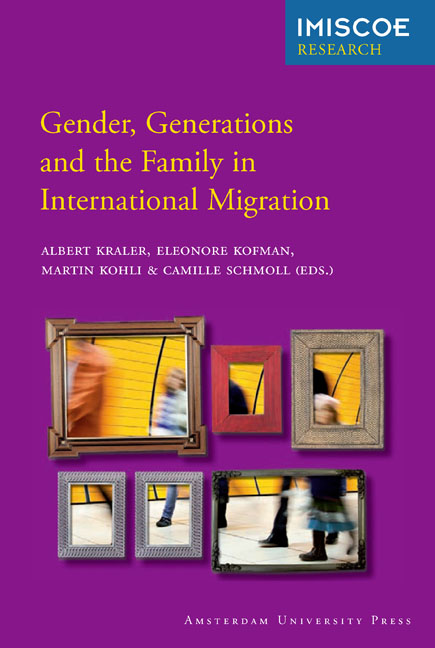Book contents
- Frontmatter
- Contents
- Preface
- 1 Introduction: Issues and Debates on Family-Related Migration and the Migrant Family: A European Perspective
- Section I The Family as a Moral and Social Order
- Section II Gender, Generation and Work in the Migrant Family
- Section III Marriage Migration and Gender Relations
- Section IV Transnational Family Lives and Practices
- List of Contributors
- Index
- Other IMISCOE titles
10 - Marriage Across Space and time Among Male Migrants from Cameroon to Germany
Published online by Cambridge University Press: 21 January 2021
- Frontmatter
- Contents
- Preface
- 1 Introduction: Issues and Debates on Family-Related Migration and the Migrant Family: A European Perspective
- Section I The Family as a Moral and Social Order
- Section II Gender, Generation and Work in the Migrant Family
- Section III Marriage Migration and Gender Relations
- Section IV Transnational Family Lives and Practices
- List of Contributors
- Index
- Other IMISCOE titles
Summary
Introduction
Since hunters have learned to shoot without missing, birds have learned to fly without perching.
Studies on immigration and integration in Germany have so far concentrated on former guestworker groups and subsequent generations, and mainly on Turkish migrants in German society. Few studies have emphasised newer migrants groups, such as sub-Saharan Africans. African migration to Germany becomes increasingly important and relevant, not only for the increasing number of migrants coming and attempting to stay, but also for their very different pathways and contextual settings compared to the ‘guestworker generation’.
There are four main reasons for studying African migration and, in particular, Cameroonian migration to Germany. First, sub-Saharan African migrants in Germany are a recent phenomenon. They started arriving in larger numbers in the mid-1980s, when an economic crisis hit many African countries. Second, compared with former ‘guestworker generations’, Cameroonian migrants present completely different pathways of entry and different strategies for remaining in the country of destination. Whereas guestworkers were at least temporarily welcomed and wanted as workers in Germany, African migrants are confronted with quite different legal and political conditions concerning access to the labour market, right to residency and family reunification regulations. Germany has a hierarchical system of classification and regulation, and distinguishes not only between European Union and non-EU citizens, but also between the different legal statuses of migrants (Morris 2000: 226).
From this follows a third point. Because Germany increasingly erects barriers intended to discourage assumed economic migrants from Africa, migrants are forced to develop new strategies in order to be legally included and obtain the right to work. According to the German Federal Statistical Office (2004), the majority of Cameroonian migrants enter Germany as students or asylum seekers. Due to their middle-class family backgrounds and their fairly high levels of education, one third of the registered migrants with Cameroonian nationality are currently enrolled as students in a German university. The second largest group of Cameroonians in Germany are asylum seekers, often without any realistic chance of being granted asylum. Neither group has a long-term right to stay and work in Germany. Official statistics on Cameroonian immigrants in Germany do not contain any information on undocumented immigrants living and working in Germany.
- Type
- Chapter
- Information
- Gender, Generations and the Family in International Migration , pp. 243 - 264Publisher: Amsterdam University PressPrint publication year: 2012
- 2
- Cited by

